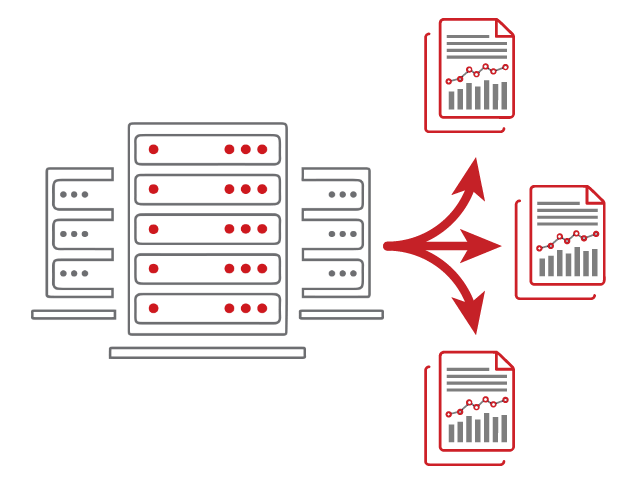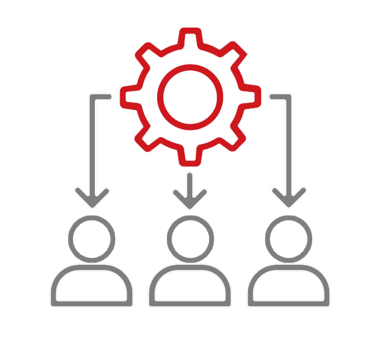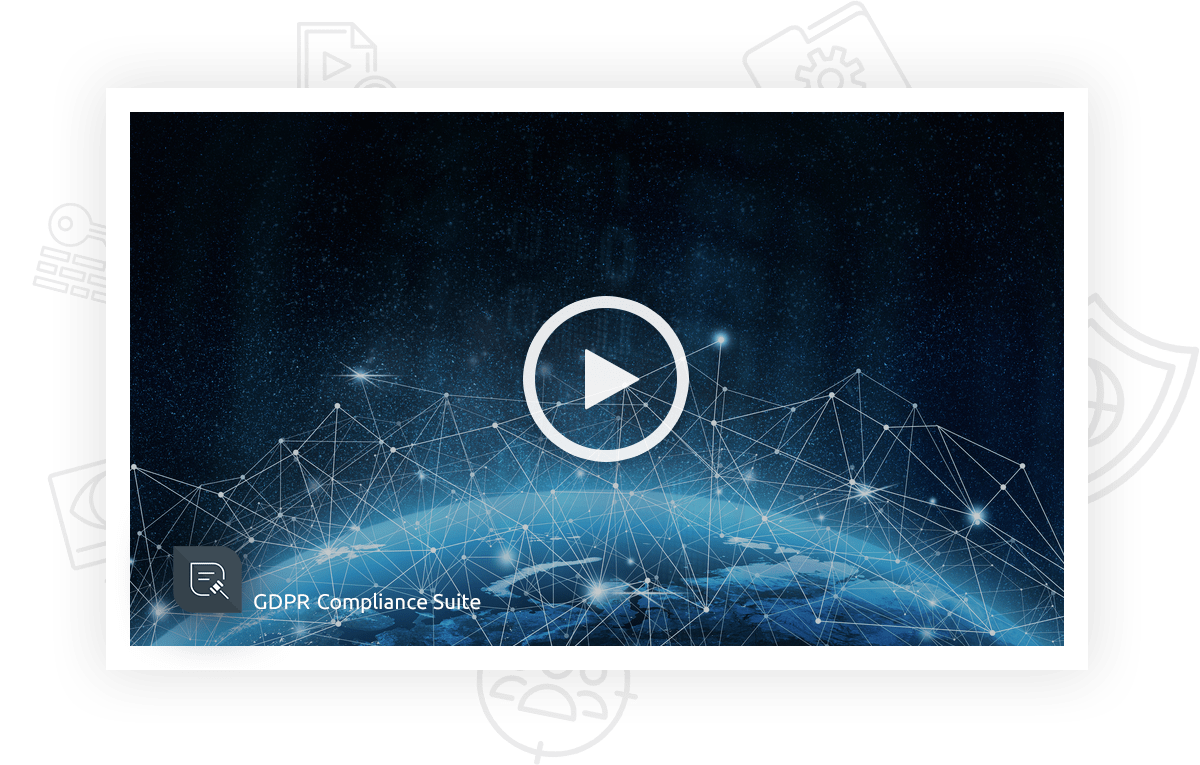-
SOFTWARE
SOFTWARENómina SAP HCM/HXMQuery Manager Query Manager Add-ons Document Builder Variance Monitor DSM para HCM HCM Productivity Suite GeoClockEntornos SAP y gestión de datos de pruebaSuite Data Sync Manager (DSM) - System Builder/Shell Sync - Object Sync - Client Sync - Data Secure Archive CentralSoporte y formaciónClient Central Aprendizaje y formación onlinePrivacidad y seguridad de datos SAPGDPR Compliance Suite para SAP - Data Secure - Data Disclose - Data Redact - Data Retain Soterion (GRC)
-
SERVICIOS
SERVICIOSNómina SAP HCM/HXMPRISM for HR & Payroll Supervisión de la integración de SAP SuccessFactors Payroll reporting Creación de informesDesarrollo específico para clientesDesarrollo a medida SAP BTPEntornos SAP y gestión de datos de pruebaMigraciones PRISM a S/4HANA System Landscape Optimization (SLO) Servicios gestionados de actualizaciones de datosEntornos SAP y gestión de datos de pruebaEvaluación de la privacidad de sus datos en SAPServices d'élimination de données en masse Servicios de eliminación masiva de datos Data privacy consultingServicios gestionados de aplicaciones y nubeAMS Funcional Servicios gestionaos en la nube Migraciones a la nube Basis managed services Private cloud hosting SAP on AWS SAP en Azure Servicios de soporte premium
- SOLICITAR PRESUPUESTO
-
RECURSOS
RECURSOS Blogs Lea las últimas noticias sobre SAP SLO, SAP HCM, Datos y Privacidad y Nube Webinars Acceda a las opiniones de expertos con webinars en directo y a pedido Ebooks, guias y más.. Descargue libros electrónicos, guias y más
- ACERCA DE EPI-USE LABS
Servicios de RGPD y cumplimiento normativo sobre la privacidad
Ofrecemos soluciones que ayudan a abordar el cumplimiento normativo
Servicios de RGPD
El Reglamento General de Protección de Datos (RGPD) tiene consecuencias de largo alcance para las empresas de todo el mundo. Desde el 25 de mayo de 2018, las empresas de todo el mundo que recopilen, almacenen o tramiten datos personales de ciudadanos de la Unión Europea (UE) deben estar preparadas para revelar los datos que disponen sobre un individuo, así como el propósito con el que se almacenan y utilizan.
Para almacenar y gestionar los datos, independientemente de si estos se almacenan en la UE o no, cada empresa debe obtener el consentimiento informado del individuo al que se refieren los datos y demostrar el cumplimiento de los principios rectores de la regulación, incluida la protección de datos, que es el corazón del diseño del sistema. El cumplimiento de este reglamento no es negociable, y las empresas que sufran infracciones en lo relativo a la seguridad de sus datos se enfrentarán a sanciones potencialmente elevadas, que pueden alcanzar los 20 millones de euros (21 millones de dólares según el tipo de cambio actual) o el 4% de sus ingresos anuales, dependiendo de qué cifra sea mayor.
Cómo puede ayudarle EPI-USE Labs
Aunque todo esto puede parecer desalentador, EPI-USE Labs ofrece las siguientes soluciones, que le ayudarán a abordar el cumplimiento del RGPD.
- Data Secure™ y una suite para el cumplimiento del RGPD para SAP
- Directrices y mejores prácticas:
- Información y asesoramiento sobre dónde se almacenan los datos en SAP®
- Comprensión de los tipos de datos afectados y de las elecciones y los procesos para cumplir los requisitos
- Servicios de eliminación de datos en masa
- Talleres para conocer el RGPD
Debido a que existen muchos y variados sistemas de TI, resulta imposible ofrecer un enfoque que sirva para todos, así que permítanos compartir nuestra experiencia para ayudarle a mantenerse por delante de la competencia. EPI-USE Labs lleva más de treinta años en el ámbito de la gestión de datos de SAP, creando y desarrollando soluciones de software avanzadas, y ofreciendo asesoramiento y compartiendo su experiencia en RGPD.
Seminarios Web bajo demanda Suite para el cumplimiento del RGPD
Servicios de eliminación de datos en masa
Para la mayoría de empresas, una política de retención de datos se había considerado como un período mínimo de retención por parte de los equipos técnicos, no como un punto a partir del cual los datos se debían destruir de forma proactiva. Con el RGPD en vigor, esto ha cambiado y todas las empresas que disponen de datos históricos ya no tienen motivos legales para almacenarlos, ya sea información detallada de los familiares de antiguos empleados, cuentas bancarias de antiguos clientes o alguno de los muchos tipos de datos personales que se incluyen en el entramado de sus sistemas SAP.
EPI-USE Labs ofrece un enfoque simple para eliminar estos datos antiguos sin necesidad de proyectos de archivo complejos. Un consultor de un sistema de la infraestructura del sistema (SLO) de EPI-USE Labs puede aprovechar la tecnología utilizada para prestar soporte al producto de Data Redact para redactar o eliminar información específica sobre datos de una persona concreta con un modo de licencia específico que permite la selección de registro en masa y el procesamiento paralelo El consultor también puede dar soporte con definiciones exactas de los datos que se deben eliminar durante la limpieza inicial y el modo de seleccionar estos registros.


Datos de empleado
En muchos casos se necesitan los datos históricos de empleado, ¿pero qué ocurre si parte del negocio se vende? ¿Al cabo de 10 años podemos mantener los datos de aquellos empleados en el sistema? Incluso si deseamos mantener la mayor parte del registro de empleados, ¿qué ocurre con las datos más personales? Se puede aplicar una política inicial para llevar a cabo una limpieza en masa inicial para limpiar una pequeña cantidad de los datos altamente personales, como información familiar o números de cuentas bancarias, que se aplicaría a todas las personas que dejaron la empresa hace más de un año y, posteriormente, una segunda fase para todas las personas que dejaron la empresa hace siete años o más, que eliminaría más datos como información sobre bajas por enfermedad, evaluaciones sobre el rendimiento e información de remuneración.
Datos de la empresa al consumidor
En este ámbito es más difícil definir los motivos legales para conservar los datos. Pueden haber miles de clientes, socios comerciales y direcciones que no han tratado con la empresa en más de cinco años. En lugar de archivar todas sus transacciones y los datos maestros, podemos proporcionarles una limpieza en masa para eliminar los identificadores de los datos maestros y las referencias a transacciones, lo que implicaría que esa persona ya no sería visible en el sistema. Además, puede ser conveniente eliminar información sobre tarjetas de crédito y posibles respuestas a preguntas de seguridad mucho antes que los registros de clientes antiguos.
Contacte con nosotros para comentar los requisitos y cómo podemos ajustar nuestros servicios de limpieza en masa para ayudarle a cumplir el RGPD.
Contacte con nosotros para obtener más información sobre la eliminación en masa
Personal Data Rights
The main emphasis of GDPR is on Personal Information. GDPR aims to protect personal data rights such as the right to be informed, the right of access, the right of rectification, the right to erasure (aka the right to be forgotten), the right to strict processing, the right to data portability, the right to object and rights to automated decision-making and profiling.
Key requirements for GDPR
- Consent for storage must be given by the data subject
- Consent must be explicit
- Each individual has “the right to be forgotten”, although this comes with several caveats
- Compliance must be demonstrated
- Notification of data breaches must be provided
Data privacy must be by design
Organisations wishing to store data must have explicit consent from the subject of the data. The reason for storing it must be transparent, and the data subject has the authority to block processing while concerns are dealt with, as well as to request the removal of the information from the system. There is nothing to say that data must be anonymised – the law is not that prescriptive. However, the law does say that there must be documentation showing that data protection is by design, and that processes comply with the rights of the data subject.
Overwhelming data requests
The difficulties will start when someone requests the details of where their personal data is being kept in an IT system. Let’s complicate that: let’s say your organisation receives ten requests – or even one hundred – to locate sensitive, personal data. Imagine having to log into a number of SAP systems to download table entries, or take screenshots to show the data subject’s footprint. How many password resets will be required? Do you know all the places to look? And how long will this take?
.
Your challenges include
- The complexity, volume and sheer scale of GDPR
- Lack of consistency: Every GDPR compliance project is different, depending on the industry, existing IT systems, usage of data, etc.
- Ambiguity: While the GDPR is comprehensive, there are many areas that are neither detailed or prescriptive. It doesn't specifically tell organisations what to do; it’s up to them to analyse their systems, processes and data and work out what to do for themselves.
How GDPR affects SAP systems
It’s not easy for SAP systems to comply with the demands of GDPR because of its architecture. SAP stores information in an intricate and tangled way. Data is stored and replicated across the system in many places, such as customer master, business partner, change document tables, and so on. SAP is also highly configurable, so when it is implemented, the way in which this happens dictates which tables and fields the data will be stored in. An additional complication is that there are often multiple copies of systems. The data might be in Z-tables, and the only way this can be verified is to get into that system.
Don’t delay!
The requirements of GDPR go to the very core of your IT systems, because they need to be built into the design; a project like this can affect your CRM systems, your ERP systems and customer first line support. Entire new business processes have to be put into place. You will also need an auditor to scrutinise your security arrangements. Every organisation should have a plan to meet the requirements, and assign key roles and responsibilities to that plan.
EPI-USE Labs will help you deal with GDPR. Our knowledge, experience, expertise and products will help you sleep peacefully at night in the knowledge that everything is under control.
Tackling GDPR in detail
The importance of privacy, transparency and technology

Personal Data Rights
The main emphasis of GDPR is on Personal Information. GDPR aims to protect personal data rights such as the right to be informed, the right of access, the right of rectification, the right to erasure (aka the right to be forgotten), the right to strict processing, the right to data portability, the right to object and rights to automated decision-making and profiling.

Your challenges include
- The complexity, volume and sheer scale of GDPR
- Lack of consistency: Every GDPR compliance project is different, depending on the industry, existing IT systems, usage of data, etc.
- Ambiguity: While the GDPR is comprehensive, there are many areas that are neither detailed or prescriptive. It doesn't specifically tell organisations what to do; it’s up to them to analyse their systems, processes and data and work out what to do for themselves.

Key requirements for GDPR
- Consent for storage must be given by the data subject
- Consent must be explicit
- Each individual has “the right to be forgotten”, although this comes with several caveats
- Compliance must be demonstrated
- Notification of data breaches must be provided

How GDPR affects SAP systems
It’s not easy for SAP systems to comply with the demands of GDPR because of its architecture. SAP stores information in an intricate and tangled way. Data is stored and replicated across the system in many places, such as customer master, business partner, change document tables, and so on. SAP is also highly configurable, so when it is implemented, the way in which this happens dictates which tables and fields the data will be stored in. An additional complication is that there are often multiple copies of systems. The data might be in Z-tables, and the only way this can be verified is to get into that system.

Data privacy must be by design
Organisations wishing to store data must have explicit consent from the subject of the data. The reason for storing it must be transparent, and the data subject has the authority to block processing while concerns are dealt with, as well as to request the removal of the information from the system. There is nothing to say that data must be anonymised – the law is not that prescriptive. However, the law does say that there must be documentation showing that data protection is by design, and that processes comply with the rights of the data subject.

Don’t delay!
The requirements of GDPR go to the very core of your IT systems, because they need to be built into the design; a project like this can affect your CRM systems, your ERP systems and customer first line support. Entire new business processes have to be put into place. You will also need an auditor to scrutinise your security arrangements. Every organisation should have a plan to meet the requirements, and assign key roles and responsibilities to that plan.
EPI-USE Labs will help you deal with GDPR. Our knowledge, experience, expertise and products will help you sleep peacefully at night in the knowledge that everything is under control.

Overwhelming data requests
The difficulties will start when someone requests the details of where their personal data is being kept in an IT system. Let’s complicate that: let’s say your organisation receives ten requests – or even one hundred – to locate sensitive, personal data. Imagine having to log into a number of SAP systems to download table entries, or take screenshots to show the data subject’s footprint. How many password resets will be required? Do you know all the places to look? And how long will this take?
A quién hemos ayudado

Las dificultades que teníamos antes de implementar Data Sync Manager estaban relacionadas con la fiabilidad y la calidad de nuestros datos de prueba: no se habían actualizado durante varios años y se habían manipulado manualmente para ajustarse a ciertos escenarios.
Descubra como DSM ayudó a Innogy
Ian Naylor, Innogy Business Systems

DSM de EPI-USE Labs pasó brillantemente la prueba y fue claramente la más destacada. Un factor que marcó la diferencia fue el equipo de EPI-USE Labs con el que trabajamos localmente, que fue capaz de responder en tiempo real a cualquier problema que planteásemos.
Shaun Code, jefe de Operaciones de TI empresariales de AGL


